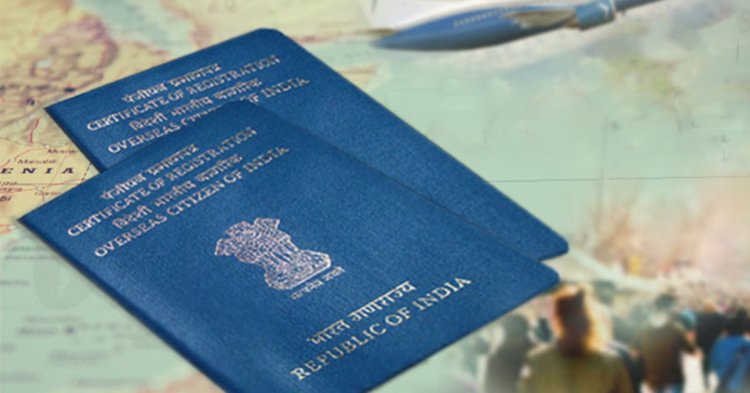OCI Card for Indian-Origin U.S. Citizens: Am I Eligible & How Do I Apply?
Learn if you're eligible for an OCI Card, how to apply, and why it's a game-changer for Indian-origin U.S. citizens. Step-by-step process explained!

If you’re a U.S. citizen of Indian origin, the OCI (Overseas Citizenship of India) card can be your golden ticket to staying connected with your roots. Imagine visiting India without the hassle of repeatedly applying for a visa or worrying about your length of stay — that’s just one perk of holding an OCI card.
This article dives deep into the eligibility requirements and step-by-step OCI card application process, so you’ll know exactly what to expect. For a complete guide and professional help with your OCI application, check out this detailed resource.
In the next few minutes, you’ll learn how to apply for the OCI card, find out if you’re eligible, and understand the benefits and responsibilities that come with it. Whether you’re planning to visit family, explore business opportunities, or just reconnect with your heritage, this guide has you covered.
What is an OCI Card?
An OCI card grants lifelong visa-free travel to India for individuals of Indian origin who are now citizens of another country (excluding Pakistan and Bangladesh). Though it doesn’t equate to full Indian citizenship, it provides many rights similar to those of Indian nationals.
Key Benefits of an OCI Card:
-
Multiple entry, multi-purpose lifelong visa to India.
-
Exemption from reporting to police authorities for any length of stay in India.
-
Parity with NRIs in financial, economic, and educational fields (except for the acquisition of agricultural or plantation properties).
Am I Eligible for an OCI Card?
Eligibility for an OCI card is based on your Indian heritage. Here's a quick breakdown:
You're eligible if you:
-
Were an Indian citizen on or after January 26, 1950.
-
Belonged to a territory that became part of India after August 15, 1947.
-
Are a child, grandchild, or great-grandchild of such a person.
-
Is a minor child with at least one parent who is/was an Indian citizen.
-
Are a spouse of an Indian citizen or an existing OCI cardholder (with certain conditions).
You are not eligible if:
-
You, your parents, or grandparents have ever been citizens of Pakistan or Bangladesh.
-
You’re applying based on marriage, and the marriage is less than two years old.
Required Documents for OCI Application
To avoid delays or rejections, make sure you have the following documents ready:
For Adults:
-
Copy of U.S. passport (with a minimum validity of 6 months)
-
Copy of naturalization certificate (if applicable)
-
Old Indian passport (or proof of Indian origin)
-
Passport-size photographs (as per specification)
-
Address proof
For Minors:
-
Birth certificate
-
Parent(s)’ passports and proof of Indian origin
-
Parental consent (affidavit or declaration)
For Spouse-Based OCI:
-
Marriage certificate
-
Proof that the spouse is a citizen of India or holds an OCI card
-
Declaration that the marriage is still subsisting
Step-by-Step Guide: How to Apply for an OCI Card
Applying for an OCI card may seem overwhelming, but if you follow these steps, you’ll be well on your way:
1. Complete the Online Application
Visit the official Government of India OCI portal and fill out Part A and Part B of the form. Double-check all entries before submission.
2. Upload Your Documents
Upload all required documents and your photo/signature digitally on the portal. Ensure they meet the size and format requirements.
3. Pay the Fee
The fee varies slightly based on the processing center but generally ranges between $275-$300. Payment is usually made online.
4. Book an Appointment
You’ll need to visit a VFS Global or Indian consulate office, depending on your jurisdiction. Book your appointment early, especially during peak travel seasons.
5. Submit the Application in Person
Bring originals and copies of your documents. You’ll be asked to verify biometrics (for adults) and sign relevant forms.
6. Track Your Application
After submission, you can track the status online. Processing generally takes 6–10 weeks.
???? For professional guidance and a smooth process, consider this trusted OCI application service.
Common Mistakes to Avoid
-
Uploading incorrect file sizes or blurry photos
-
Mismatched information between documents
-
Not including a marriage certificate for spouse-based applications
-
Submitting an outdated form version
Frequently Asked Questions (FAQ)
Q: Can I apply for an OCI card if my Indian passport is lost?
Yes, but you must provide alternative proof, like your naturalization certificate showing Indian nationality or other supporting documents.
Q: How long does the OCI card remain valid?
The card is valid for life. However, for individuals under 20 or over 50, re-issuance is required after passport renewal.
Q: Can OCI holders work or study in India?
Absolutely! OCI holders can work, study, and do business in India, except in certain areas like agricultural land purchase.
Q: Is dual citizenship allowed with an OCI card?
No. India does not allow dual citizenship, but the OCI card provides many of the same benefits as Indian residency without full citizenship.
Why the OCI Card is a Game-Changer
Whether it’s visiting family in Delhi, exploring India’s booming startup scene, or retiring near the beaches of Goa, the OCI card opens up a world of opportunity. It's more than a travel document — it’s a bridge to your heritage.
Conclusion
For Indian-origin U.S. citizens, the OCI card is an invaluable asset. It simplifies travel, opens up economic and educational opportunities, and helps you stay connected to India. If you meet the eligibility criteria, there’s no reason not to apply.
Got questions or experiences to share about your OCI application? Drop them in the comments below — we’d love to hear from you!
What's Your Reaction?


















.jpg)